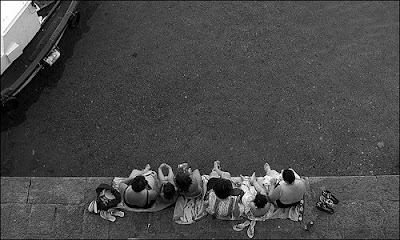book review: Thousands

Thousands.
Photo: Kyungwoo Chun.
Text: Nils Ohlsen, Wulf Herzogenrath, Jiyoon Lee & Urs Stahel.
Published by Hatje Cantz Verlag, 2008.
ISBN: ISBN 978-3-7757-2167-7.
In photo books the images usually stand in the center; the focus is the result of a project. Rarely is anything said about the process, the way to the results. With the Korean photographer Kyungwoo Chun's new book, the situation is different. Here the process itself is as interesting as the photographic works. Thousands consists of a well-told history, a thought-out project, which goes beyond the ordinary.
In 1592 General Ri Chun Man emigrated from China, left his family and began a new life in Korea. Over 400 years and sixteen generations later, the photographer, Kyungwoo, became interested in his unusual surname Chun (“thousand" in English) and fascinated by his ancestor, the famous general, his life and living. Following the general’s tracks led to three remote villages in the Chinese Henan-district. Almost every resident in and around the villages bore the family name Chun, which was also the name of one of the villages.
Together with the villagers Kyungwoo Chun organized and carried out the project Thousands. He portrayed one thousand people with the name Chun. Exposure times were long, and referred again to the family name: sixty seconds per portrait, a total of one thousand minutes. After developing the prints in Germany, where Kyungwoo now lives, he returned to China with the pictures. On each and every one of the photographs, the portrayed wrote their name, age and place of birth.
 © Kyungwoo Chun.
© Kyungwoo Chun.One of the families, who bore the name Chun, was instructed to follow the road, by which general Ri Chun Man in the 1500s traveled from China to Korea. The family carried Kyungwoo’s one thousand photographs, packaged in red silk. Arriving in Seoul, stamps were put on the pictures and, one by one, they were posted to Kyungwoo Chun’s studio in Germany. Once in Germany, the now often damaged photographs, were assembled and exhibited.
The thousand portrayed Chun’s are all looking into the camera. Their faces are blurred, because of the long exposure time. The tone of the images is red, in China considered to be a lucky color, which reinforces their timeless feeling. Together, the photographs are a kind of archive of General Chun’s contemporary relatives. When all are exhibited at one time, as in Thousands, they remind me of an army, a sort of modern parallel to the old and famous Chinese terracotta army. In addition to the one thousand portraits, Kyungwoo Chun also reconstructed a general's uniform from the 1500s. He made a number of larger portraits, of male Chun’s wearing the uniform. The exposure times were now even longer. 49 minutes, reflecting the number of years General Ri Chun Man lived.
 © Kyungwoo Chun.
© Kyungwoo Chun.Kyungwoo Chun's poetic photographs are fascinating. The long shutter times give the portraits a sense of closeness and distance. By their nature, they are on the borderline between photography and painting. At the same time, their unique character is reminiscent of the childhood of photography, to daguerreotyper and wet plates, Thousands are, as I have stated, a photo book beyond the ordinary. It’s a book about the meeting of cultures, about history and the present. A book that addresses the tradition and meanings of kinship, in the past as well as in contemporary societies. A book which indirectly raises the question whether the results are always the most important. A book to think about. And not least, a book filled with beautiful and fascinating photographs.
- Fredrik Skott
Kyungwoo Chun was born in 1969 in Seoul and now operates in Germany. He has studied photography in both countries and has, since the mid-1990s, carried out numerous exhibitions throughout Europe and Asia. During 2009 it´s possible to see his work in Denmark (Åarhus kunstbygning, Aarhus), South Korea (Total museum of contemporary Art, Seoul) and Germany (Galleri DNA, Berlin).
Thanks to Rhonda Prince for help with the translation of this review.

.jpg)




















